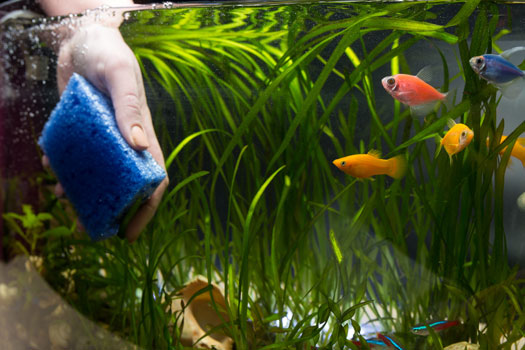88YTY News Hub
Stay updated with the latest trends and news.
Aquarium Zen: How to Keep Your Fish Happy and Your Water Clear
Discover the secrets to a thriving aquarium! Keep your fish happy and your water crystal clear with expert tips and tricks. Dive in now!
5 Essential Tips for Creating a Zen Atmosphere in Your Aquarium
Creating a Zen atmosphere in your aquarium requires careful consideration and planning. First and foremost, choose the right tank size. A larger aquarium allows for more intricate layouts and enhances the overall tranquility of the environment. Next, incorporate natural elements such as rocks, driftwood, and live plants, which mimic a serene aquatic habitat. These elements not only provide shelter for fish but also contribute to the calming aesthetic you strive for. Remember to select plants that thrive in conjunction and support the well-being of your fish.
Lighting plays a vital role in establishing a peaceful ambiance. Opt for soft, adjustable lighting to create a soothing effect within your aquarium. Avoid harsh white lights; instead, consider using LED options that can emulate natural daylight cycles. Moreover, adding gentle background sounds, such as a bubbler or water pump, can enhance the sensory experience, making your aquarium an oasis of calm. Lastly, regularly maintain your aquarium to ensure a healthy ecosystem, keeping both your fish and plants flourishing in a tranquil environment.

How to Maintain Crystal Clear Water: A Guide for Aquarium Enthusiasts
Maintaining crystal clear water in your aquarium is essential for the health and well-being of your fish and plants. To achieve this, regular maintenance tasks should be a part of your routine. Start by performing regular water changes, ideally every two weeks, removing about 10-15% of the water. This will help dilute any toxins and pollutants that accumulate over time. Additionally, utilizing a high-quality filter is crucial; ensure it is properly rated for the size of your aquarium and clean or replace filter media as needed to maintain its effectiveness.
In addition to regular maintenance, consider the following tips to further enhance water clarity:
- Balance Your Bioload: Avoid overstocking your tank, as this can lead to excess waste and cloudy water.
- Monitor Water Parameters: Regularly test for ammonia, nitrites, nitrates, and pH levels to ensure a stable environment.
- Use Activated Carbon: This can help to remove impurities and toxins from the water, improving clarity.
- Control Algae Growth: Keep lighting conditions in check and avoid excessive feeding to reduce algae blooms.
By following these guidelines, you can enjoy a vibrant and healthy aquarium with crystal clear water.
Are Your Fish Happy? Signs of a Healthy Aquarium Environment
Ensuring that your fish are happy is essential for a thriving aquarium. One of the most notable signs of a healthy aquarium environment is the behavior of your fish. When your fish are content, you’ll see them swimming actively, exploring their surroundings, and interacting with one another. In contrast, signs of distress may include excessive hiding, erratic swimming patterns, or staying near the surface of the water. Additionally, water quality plays a crucial role; clear water, appropriate temperature, and balanced pH levels are foundational for fish happiness.
Another vital aspect to consider is the structure and decoration of your aquarium. Fish require places to hide and explore, so incorporating plants, rocks, and other decorations can greatly enhance their well-being. Regular maintenance is also key; overgrown algae or a buildup of waste can lead to stress for your aquatic pets. Observing your fish’s diet is equally important – healthy, varied feeding habits indicate that your fish are content and thriving in their environment. Keep a keen eye on these elements, and you can ensure that your fish remain happy and healthy in their aquatic home.